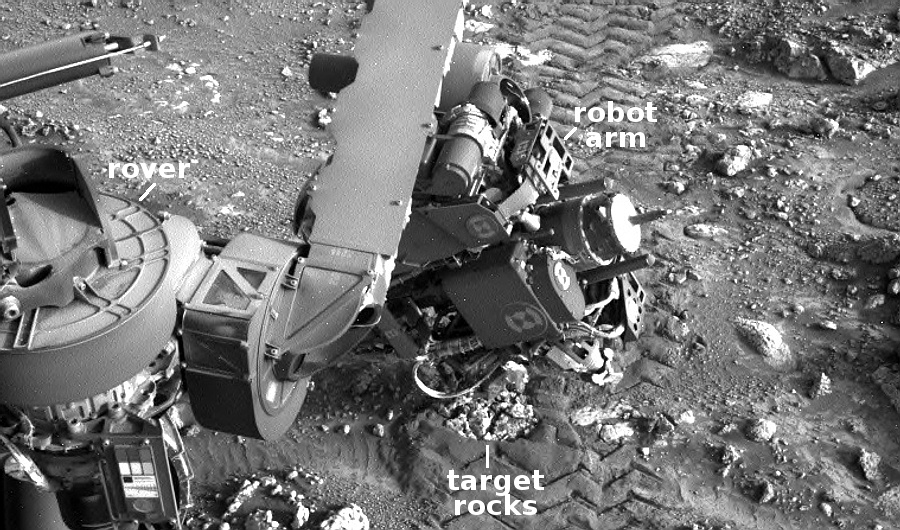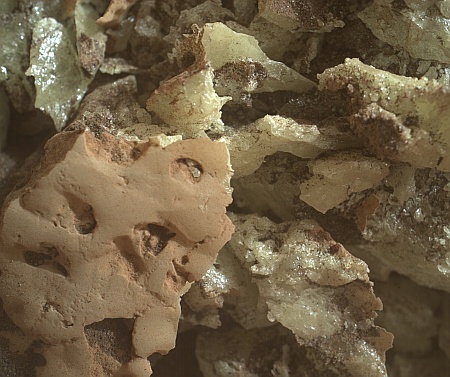Rocks broken by Curiosity’s wheels contain the first pure sulfur crystals found on Mars
When Curiosity completed a drive on May 30, 2024, subsequent images from the rover revealed that the wheels had broken apart some small rocks, revealing very bright yellow materials not normally seen on the planet.
I posted those images on June 7, 2024 — noting that such colorful and crystal-like surface features have been rarely seen by Curiosity — and post them again now, with the top picture showing the broken rocks, labeled as “target rocks”, just after the robot arm had rotated up and away from a close inspection and imaging of those rocks. The picture to the right is a close-up taken by Curiosity’s Mars Hand Lens Imager (MAHLI), located at the end of the rover’s robot arm and designed to get close-up high resolution images of the ground that the arm is exploring. Everything in this image is tiny, in the millimeters in scale.
The science team yesterday confirmed that those unusual rocks are the first pure crystals of sulfur found on the red planet.
Since October 2023, the rover has been exploring a region of Mars rich with sulfates, a kind of salt that contains sulfur and forms as water evaporates. But where past detections have been of sulfur-based minerals — in other words, a mix of sulfur and other materials — the rock Curiosity recently cracked open is made of elemental, or pure, sulfur. It isn’t clear what relationship, if any, the elemental sulfur has to other sulfur-based minerals in the area.
While people associate sulfur with the odor from rotten eggs (the result of hydrogen sulfide gas), elemental sulfur is odorless. It forms in only a narrow range of conditions that scientists haven’t associated with the history of this location. And Curiosity found a lot of it — an entire field of bright rocks that look similar to the one the rover crushed.
Analysis of samples taken from drilling into a nearby much more structurally solid rock is presently on-going. As for theories explaining the presence of this pure sulfur, those are being worked on as well.
On Christmas Eve 1968 three Americans became the first humans to visit another world. What they did to celebrate was unexpected and profound, and will be remembered throughout all human history. Genesis: the Story of Apollo 8, Robert Zimmerman's classic history of humanity's first journey to another world, tells that story, and it is now available as both an ebook and an audiobook, both with a foreword by Valerie Anders and a new introduction by Robert Zimmerman.
The print edition can be purchased at Amazon or from any other book seller. If you want an autographed copy the price is $60 for the hardback and $45 for the paperback, plus $8 shipping for each. Go here for purchasing details. The ebook is available everywhere for $5.99 (before discount) at amazon, or direct from my ebook publisher, ebookit. If you buy it from ebookit you don't support the big tech companies and the author gets a bigger cut much sooner.
The audiobook is also available at all these vendors, and is also free with a 30-day trial membership to Audible.
"Not simply about one mission, [Genesis] is also the history of America's quest for the moon... Zimmerman has done a masterful job of tying disparate events together into a solid account of one of America's greatest human triumphs."--San Antonio Express-News
When Curiosity completed a drive on May 30, 2024, subsequent images from the rover revealed that the wheels had broken apart some small rocks, revealing very bright yellow materials not normally seen on the planet.
I posted those images on June 7, 2024 — noting that such colorful and crystal-like surface features have been rarely seen by Curiosity — and post them again now, with the top picture showing the broken rocks, labeled as “target rocks”, just after the robot arm had rotated up and away from a close inspection and imaging of those rocks. The picture to the right is a close-up taken by Curiosity’s Mars Hand Lens Imager (MAHLI), located at the end of the rover’s robot arm and designed to get close-up high resolution images of the ground that the arm is exploring. Everything in this image is tiny, in the millimeters in scale.
The science team yesterday confirmed that those unusual rocks are the first pure crystals of sulfur found on the red planet.
Since October 2023, the rover has been exploring a region of Mars rich with sulfates, a kind of salt that contains sulfur and forms as water evaporates. But where past detections have been of sulfur-based minerals — in other words, a mix of sulfur and other materials — the rock Curiosity recently cracked open is made of elemental, or pure, sulfur. It isn’t clear what relationship, if any, the elemental sulfur has to other sulfur-based minerals in the area.
While people associate sulfur with the odor from rotten eggs (the result of hydrogen sulfide gas), elemental sulfur is odorless. It forms in only a narrow range of conditions that scientists haven’t associated with the history of this location. And Curiosity found a lot of it — an entire field of bright rocks that look similar to the one the rover crushed.
Analysis of samples taken from drilling into a nearby much more structurally solid rock is presently on-going. As for theories explaining the presence of this pure sulfur, those are being worked on as well.
On Christmas Eve 1968 three Americans became the first humans to visit another world. What they did to celebrate was unexpected and profound, and will be remembered throughout all human history. Genesis: the Story of Apollo 8, Robert Zimmerman's classic history of humanity's first journey to another world, tells that story, and it is now available as both an ebook and an audiobook, both with a foreword by Valerie Anders and a new introduction by Robert Zimmerman.
The print edition can be purchased at Amazon or from any other book seller. If you want an autographed copy the price is $60 for the hardback and $45 for the paperback, plus $8 shipping for each. Go here for purchasing details. The ebook is available everywhere for $5.99 (before discount) at amazon, or direct from my ebook publisher, ebookit. If you buy it from ebookit you don't support the big tech companies and the author gets a bigger cut much sooner.
The audiobook is also available at all these vendors, and is also free with a 30-day trial membership to Audible.
"Not simply about one mission, [Genesis] is also the history of America's quest for the moon... Zimmerman has done a masterful job of tying disparate events together into a solid account of one of America's greatest human triumphs."--San Antonio Express-News




Good…now some charcoal…if he has the time….